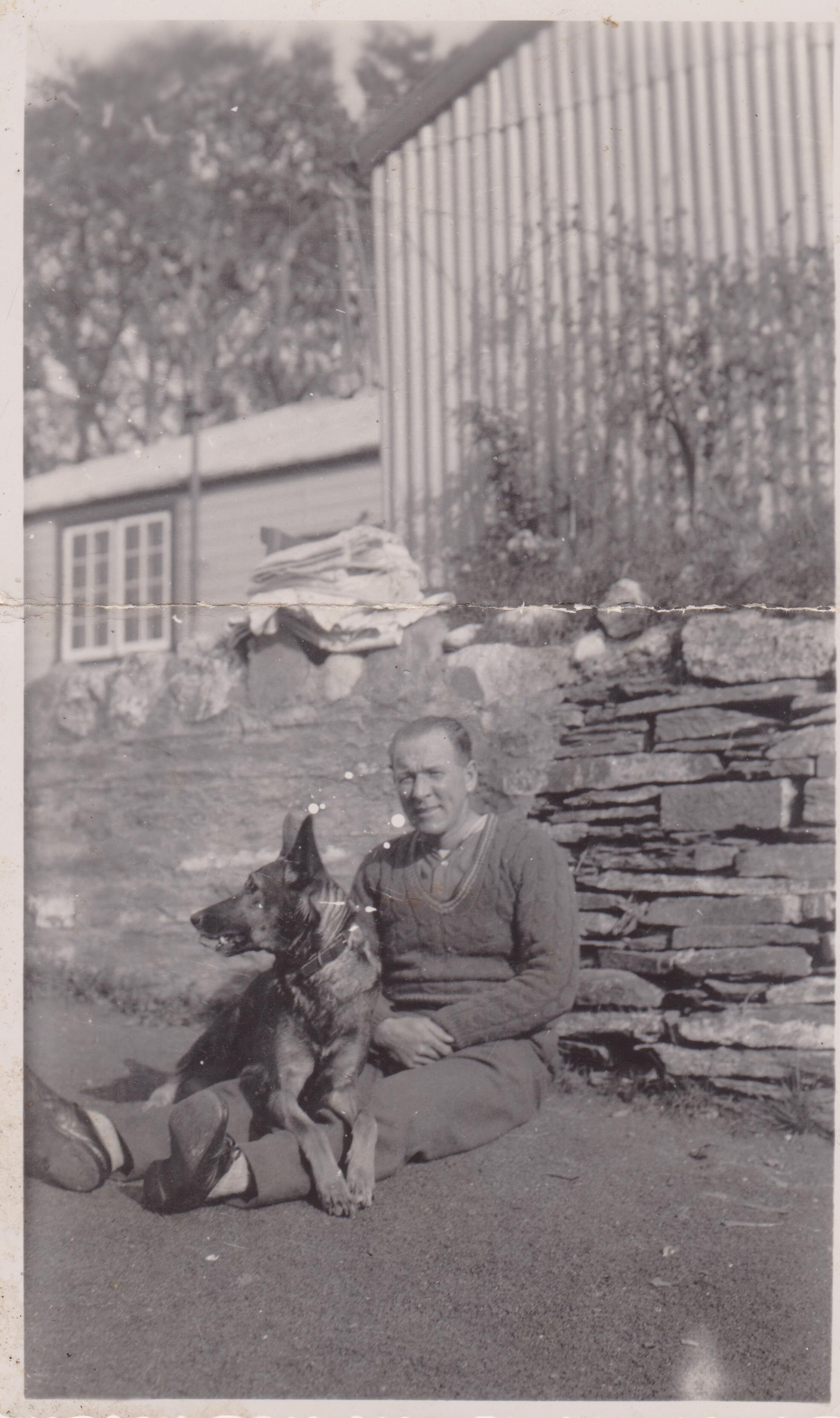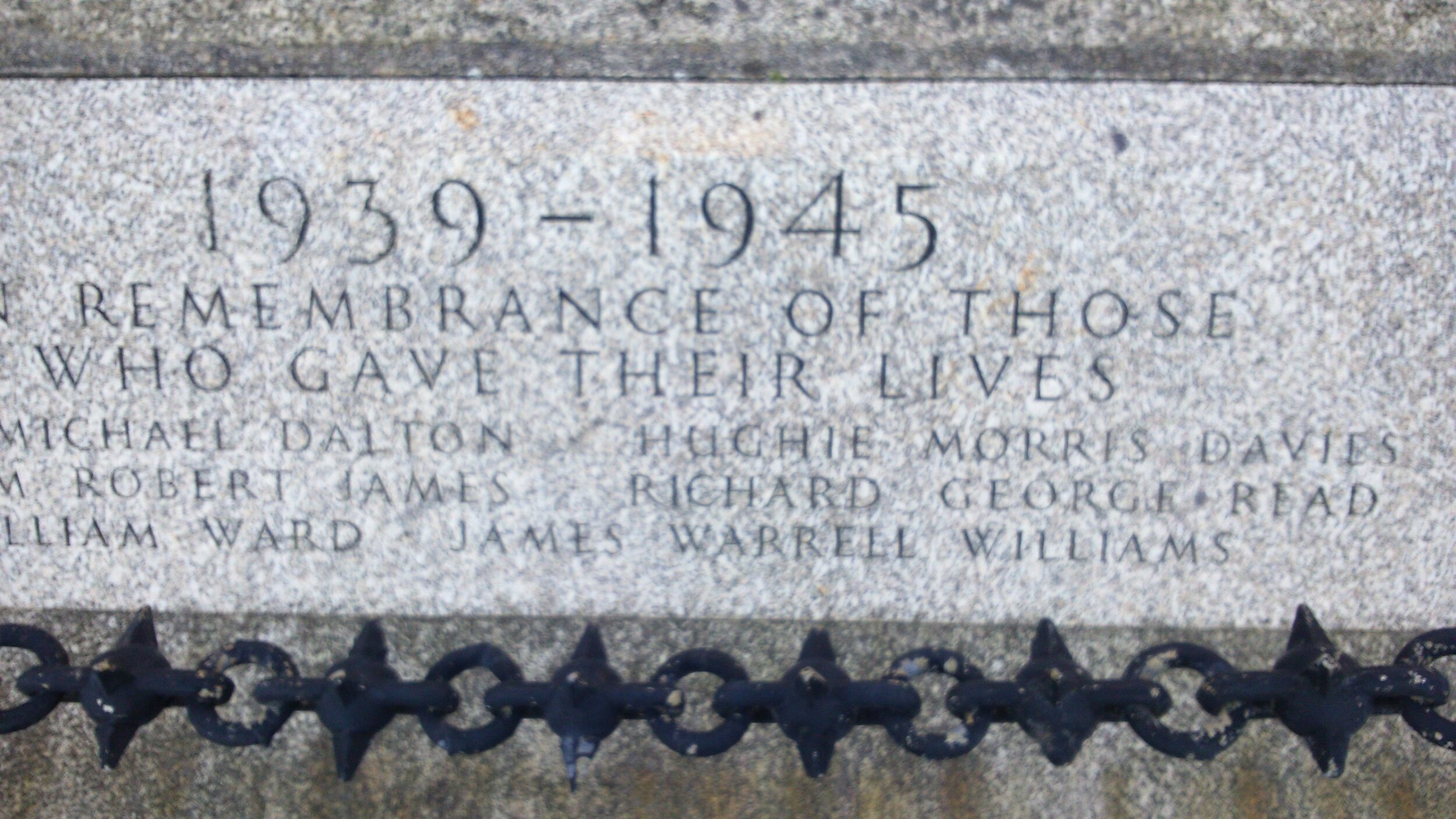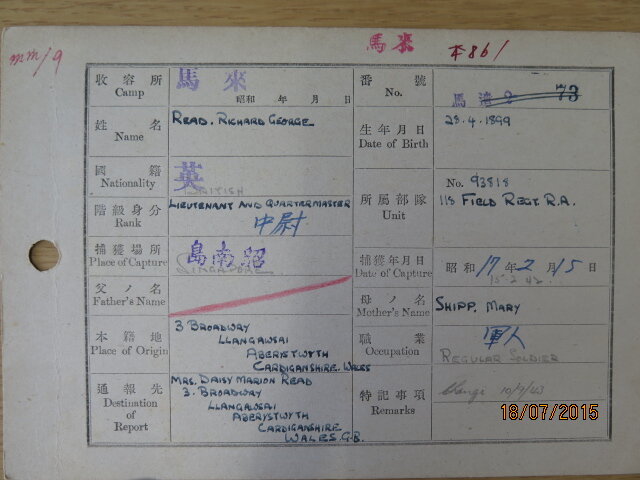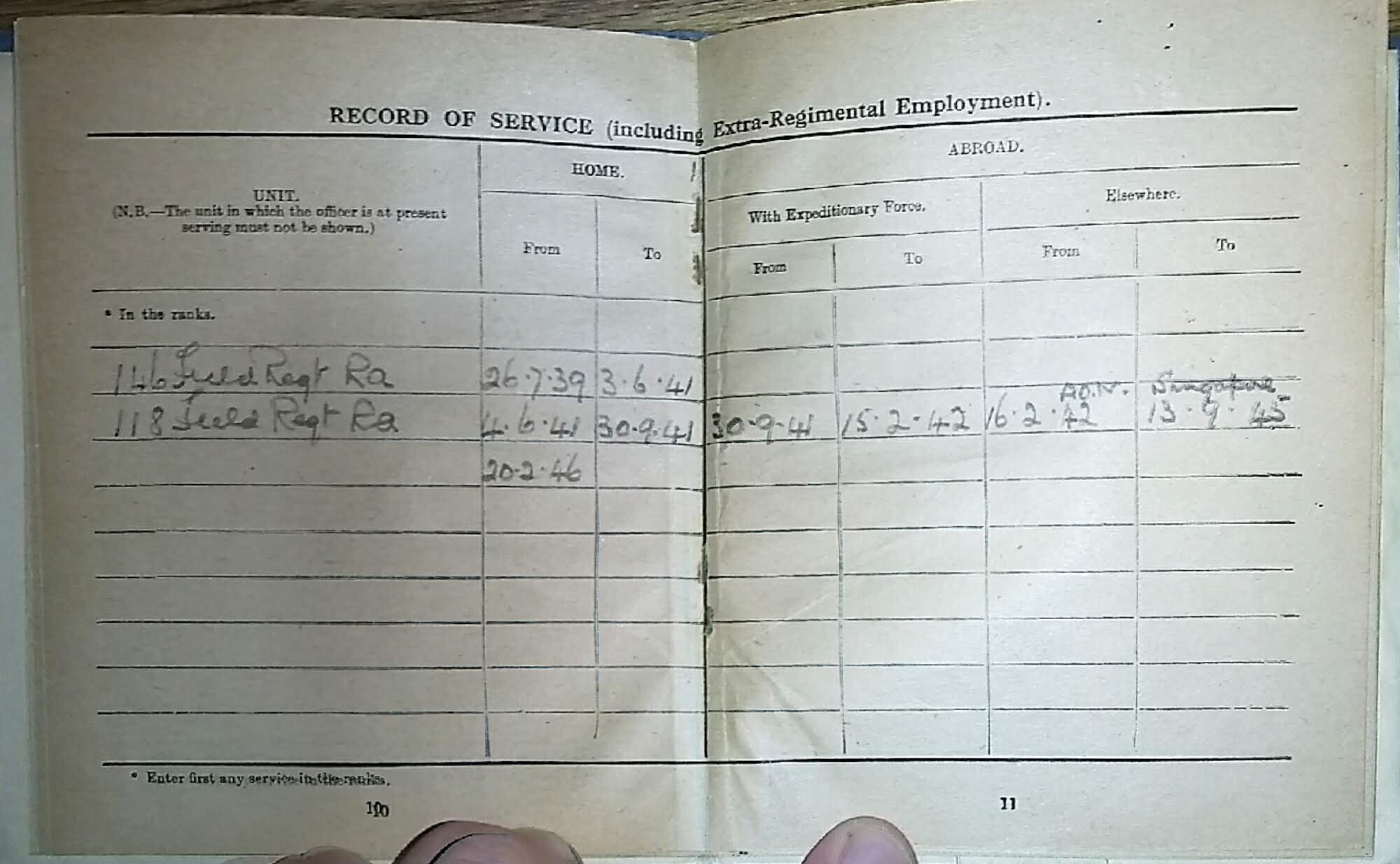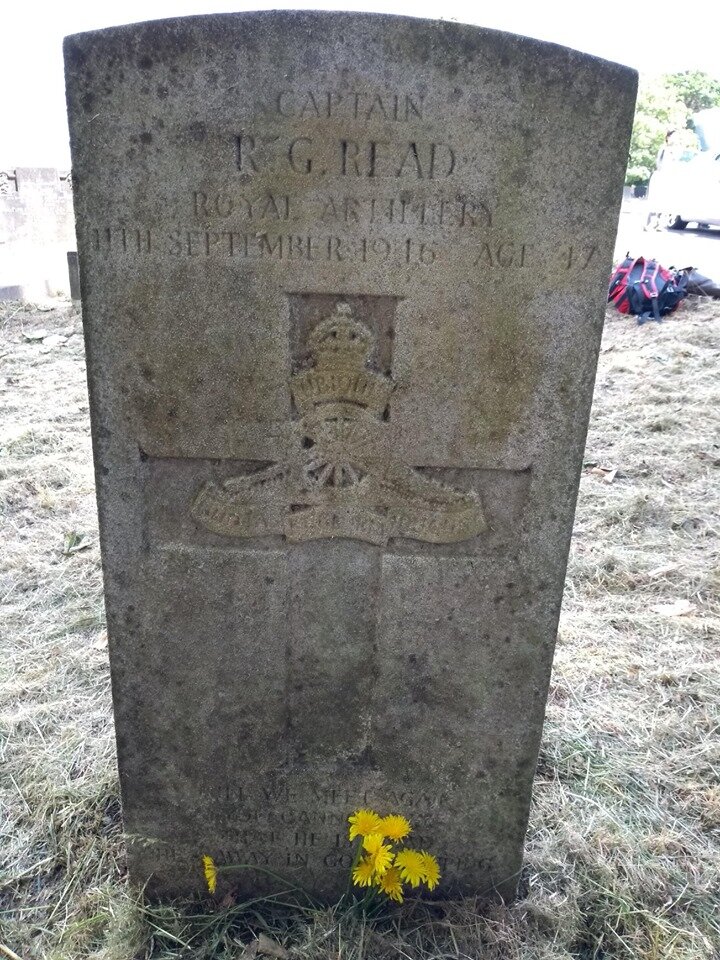#VJday
#VJday
The 15th August marks the Anniversary of Victory over Japan Day and the end of World War 2. My Great Grandfather served in the Royal Artillery between 1914 to 1946, during World War 2. He was shipped to Singapore and disembarked just days before the surrender to invading Japanese forces on the 15th February 1942, beginning nearly three and a half years held by the Japanese as a Prisoner of War in the infamous Changi POW camp.
Here is photo from his archive, this propaganda photo shows a 'work party' of 9 Allied Prisoners of War and their three Japanese Guards, most likely in the Bukit Timah area of Singapore and probably taken late in 1942 (though 'Mar '44' is written on the back). These work parties were used by the Japanese as a form of slave labour during the war. This particular photo was most likely used to illustrate to the outside world how well they treated Prisoners, a far cry from the reality of their true treatment.
My Great Grandfather suffered from many tropical diseases, the Japanese provided no medical treatment to the prisoners , leaving them to look after themselves, they also gave minimal food rations to prisoners, my Great Grandfather was 12st 10lbs at the start of his incarceration, but due to illness and malnutrition this reduced to 7st 10lbs by the summer of 1945, that’s a 40% reduction.
After the War ended he and many others who were seriously ill were taken to Hospitals to recover and put on weight, my Great Grandfather spent time recuperating in India, before returning home to his family Aberystwyth in December 1946, sadly he never really recovered and died in September 1946, he is commemorated on the Llanbadarn Fawr War Memorial near Aberystwyth.
118th Field Regiment Royal Artillery
Royal Artillery on Elephants in India. My Great Grandfather Lt R G Read (QM) was in the 118th Field Regiment Royal Artillery who were sent to train in India prior to posting to Singapore. Two weeks of ‘intensive training’ was all the preparation that they had for War in the Far East.
The 118th Field Regiment Royal Artillery, departed the UK late in 1941 bound for the War in the Middle East, however during their journey Churchill decided to send them to the Far East, the war was not going well there at his point, on the same day as the bombing in Pearl Harbour, the Japanese had started their invasion of the Malayan peninsular, threatening the Major British Base there of Singapore. Churchill decided sent additional troops to bolster the defences and hold off any invading forces.
The 118th were not prepared, trained nor did they have the correct equipment for war in the Far East, nevertheless they landed on 29th January 1942 during Japanese bombing raids of the harbour and , little did they know at the time, just days before the British Surrender on the 15th February 1942.
Arrival in Singapore
Here is my Great Grandfather in Singapore, just after his arrival in January 1942. .
My Great Grandfather Lt (QM) R G Read arrived in Singapore on the USS Westpoint disembarking with the rest of the 118th Field Regiment RA on 29th January at Keppel Harbour.
My Great Grandfather kept a diary and he somehow managed to continue to keep these diaries during his imprisonment too.
During those days before the surrender, the Japanese carried our intensive bombing missions on the troops as they disembarked and unloaded their equipment. Here my Great Grandfather writes the relentless bombing by the Japanese including the sinking of a troop ship by Japanese dive bombers and the resulting rescue.
From my Great Grandfather's diary 5th Feb 1942
'Empress of Asia bombed. 6 miles out. Dealt with about 600 survivors as rescued. 'Q' 125 badly injured looks as though he will loose his sight. Later! he has.'
Diary entry dated 6th Feb 1942
‘We loose 5 at docks whilst unloading by 27 bombers, no resistance from RAF’
Diary entry 14th February 1942
‘Casualties amount to 20 odd dead+many wounded, Capt Martin 259 killed’
Telegram from General Wavell, Commander in Chief, Southern Pacific, dated 10th February 1942.
Here is a Telegram of General Wavell's last order sent on the 10th February 1942, just days before the surrender on the 15th Feb, containing the instruction;
'Commanders and Senior Officers must lead their troops and, if necessary, die with them. There must be no thought of surrender and every unit must fight it out to the end and in close contact with the enemy.'
Telegram from the ‘Nippon Army’ inviting the surrender of the allied troops in Singapore, dated 13th February 1942
This telegram presenting an ‘Admonition of Peace’ inviting the Allied forces to an ‘honourable’ surrender. It also attempts to give assurances as to how well that they will treat them upon their surrender.
‘Upon my word we won’t kill you, treat you as officers and soldiers if you come to us, But if you resist against us we will give swords’
Transcript of the Invitation of surrender of Allied Forces, on the 15th February 1942 at 5.30pm, written by Lieut-General Tomoyuki Yamashita, ‘High Commander of Nippon Army’
Lieut-General Yamashita had successfully led his 30,000 troops to overcome the 85,000 defending allied troops on Singapore.
To this day , it was the largest surrender of British led forces in history. Winston Churchill called it ‘the worst disaster’ in British Military History.
Telegram written by Lieut-General A. E. Percival, explaining the reasons for surrender to Japanese Forces on the 15th February 1942.
‘The essential of War have run short, In a few days we shall have neither Petrol nor Food. Many types of ammunition are short, and the water supply, on which the vast civilian population and many of the fighting troops are dependant, threatens to fail.’
Surrender to the Japanese, 15th February 1942
Here is the diary entry from the date of the Surrender to the Japanese on the 15th February 1942
‘The Surrender of Singapore to Japan.
“B” Echelon to report to RHQ at Thompson Road.’
Money and Pay
Handmade Officers Prisoner Pay Book belonging to Lt R G Read, whilst in Changi POW Camp, dated 1942-44
The Prisoners themselves were given ‘pay’ by the Japanese during this period, though from this was deducted payments for board and food at a rate decided upon by the Japanese. Any remaining currency was used by the prisoners to pay for additional food, medical supplies or equipment that they could purchase on the black-market or from bribes made to guards. Deductions were also made to pay for the prisoners hospital, set up and run by the prisoners themselves, as the Japanese provided them with no medical equipment.
My Great Grandfather was a Lieutenant ‘Quartermaster’ in his Regiment, so he was tasked with purchasing extra food and equipment when it was required;
From his Diary,
dated 18th February, just a few days after the surrender
‘I manage to get a lorry loaded and right through to Changi, awkward moments with Japs, many threats’
Dated 27th May 1942
‘Shopping trip with Melana and Toliga, 3hrs, Reminded of doing a little at Aber, only on a larger scale.’
Dated 9th June
‘Shopping Day, spent quite a big cut $300’
Letters Home
Telegram sent by my Great Grandfather to his wife, my Great Grandmother, Daisy , upon his arrival in Singapore, dated 31st January 1942. NOTE date received was 10th August 1944
Telegram sent by Captain R G Read to his wife Daisy Read (Llangawsai, Llanbadarn Fawr) , dated 31st January 1942 but not received until 10 August 1944, this may have been the first that Daisy new that her husband was still alive and a prisoner of war, attached to this telegram (below) is an explanatory note regarding the delay from the Post Master General.
Cruelty and Punishment
Diary entry dated 5th September 1942
‘Hear Changi Camp (17,000) refuse to sign Papers, all interned for 6 long days. Pretty mess this.’
Diary entry dated 6th June
‘Hear today that Changi Camp have signed. All troops back to own billets…4 destroyed at Changi for attempt to escape.’
Discipline in the camps was harsh and cruel, attempts at escape were met with violence some ending in firing squad or beheadings. In one incident, known as the 'Selerang Barracks Incident' which started on 30 August 1942 as a result of the Japanese recapturing four POWs who had attempted an escape. The Japanese Guards required that the other 17,000 prisoners in the camp sign a pledge never to attempt to escape again. After they refused, they were forced to crowd in the barrack square for nearly five days with little water and no sanitation. This failed to break the men, however the Prisoner’s Commanding officers realised that the dire conditions of the prisoners would soon lead to more loss of life through disease, lack of water and and starvation. He instructed the men to sign the pledge, which they all eventually did, though many did so using false names. The Japanese later took the four men who had attempted to escape to the nearby beach area and shot them by firing squad.
Incidents like this badly affected those who were fortunate enough to survive, up to a third who returned home suffered what is now known as PTSD. At that time Mental health was often 'hushed up' or 'brushed under the carpet' meaning many prisoners were often left to deal with these issues on their own, with families of the prisoners often having to deal with the aftermath.
Diet and Starvation
Diary entry from 23rd May 1945
‘Snails, rats, seaweed + dogs latest delicacies,
Red Cross parcels 1 between 20 men’
May 24th
‘Tummy still playing up’
25th May
‘Average weight in camp on decrease’
The Japanese had refused to sign up to the Geneva convention and many of the camp guards were notorious for their acts of cruelty to their prisoners, the Japanese used the prisoners as slave labour, either on the infamous ‘Death Railway’ built by the POWs between Burma and Thailand or were used in mines or as slave labour in Japan or their invaded territories. Food was rationed and the amount and quality given to the prisoners worsened as time went on. By 1945, even the Japanese troops were running our of food as the war entered it’s final phase. The Prisoners were forced to eat anything they could find. Many died in these final months as the years of malnutrition, starvation, tropical diseases and exhaustion took its heavy toll on them.
‘
Work and Entertainment
Handmade Tobacco tin, inscribed with the insignia of the Royal Artillery, and inside a dedication to Lieut. QM R G Read, 118th Field Regiment RA, MALAYA.
This tin was probably made by one of skilled prisoners in Changi POW camp. Prisoners with skills were quickly identified and put to useful work in the camps. There were many skilled artists and craftsmen in these camps, and they created some magnificent pieces of art under extreme conditions, some used their skills to create items such as this tobacco tin to use as gifts or for bartering with other prisoners or guards to get food or cigarettes or other essential items.
Diary entry 190th October 1942
‘…RSM organising New Church. Christian sketched , Madonna, Jesus Christ, really a work of art. Other boys making pewter for the alter and the like.’
Moral was an important tool to keep the prisoners ‘spirits up’. Educational events, gardening and many other tasks were used to provide valuable distraction and much needed extra supplies, and when possible entertainment was organised too.
Diary entry from;
21st December 1942
‘…The Shoe Shine Chokos give first concert, jolly good show, livened us all up’
31st June 1943
‘Three hours wood cutting, then over to ‘Smokey Joes’
16th January 1943
‘Attended lecture by Maj. Hunt Australian RAMC on vitamins. What we must eat to keep alive and well. Rice polishings , White Bait, Palm Oil. Meat now gone completely. Fresh Fish issue approx 12 oz per day’
19th May 1943
‘First Experience of Garden Fatigues in G+W Area. Pretty hot seeding Sweet Potatoes with George Seebohm. half day only. Jap wanted to buy my shirt which I left in the shed.'
20th May 1943
'Our work now consists Gardening, Tree Felling, wood sawing. anti-malarial work and general fatigues- tree pulling etc.'
In the days leading up to the Japanese surrender on the 15th August, those in the camps could only guess and speculate as to what was going on in the outside world, though they had radio receivers and were getting information in, they were reluctant to believe that their ordeal could be coming to an end.
Diary
27th July ‘Weak condition. caught bad cold.’
28th July ‘Cold a little better but dry cough. Tummy Improved. Some of our boys are feeling very weak. Hope soon out’
29th July ‘Invalided. Dysentry. Cold much better, still chesty’
30th July ‘Little change with new IJA Commander Banu (?)
31st July ‘MO really not decided what my ailment is. Dyspepsia, or Ulcers’
1st August ‘Weight about the same, very weak condition. Hope released soon.’
3rd August ‘ Informed of promotion to Capt.QM by IJA. told will not affect our pay here.’
4th August ‘Inoculated TAB’
9th August ‘S.C. Lee Wed Anniversary’
11th August ‘Have some GREAT NEWS, hardly believable yet, tummy still playing up.’
12th August ‘Great excitement through out camp. Rumours Galore.’
13th August ‘ Still exercising extreme precaution.’
14th August ‘Extra 50gms Rice and 20gms of Oil, issued on the QT “The Excitement” ‘
15th August ‘KENT REALLY at 08.30’
16th August ‘ Nothing Official Yet’’
17th August ‘ Pretty well certain.’
18th August ‘ These days of uncertainty have a telling effect.’
19th August ‘Rumours run wild but biding time.’
20th August ‘Nothing issued by Gen. Sato’
21st August Still anxious.’
22nd August ‘Another day of whispering but OK for some.’
23rd August no entry
24th August ‘Outside Camp, Outram Road prisoners return.Now 12,000, Food + clothing pouring in. Cigg issue. Cable sent 21/8. Now Happy although in poor health. Troops well behaved up till now.’
25th August no entry
26th August ‘All good news now. Fish 1g’
28th August ‘Sime Rd + rest of camps . 1st Liberator over. Pamphlets dropped insisting kindness to POW’s. Tummy much better but still unwell.’
Once the news of the surrender and their release was finally confirmed, the camp could finally begin to let it sink in, their ordeal was over, but for some this still meant many more weeks recovery before heading home.
29th August 1945 "Liberators dropping pamphlets (2)"
30th August "One Lib over camp 08:00, dropped 1st British troops, i.e. 2 Med Officers, 2 Orderlies, 2 Combatant Officers of 4th Indian Div. One Col. dropped with SW set appears to be missing, above look fit and well as compared to our people. Their jobs, MO's arranging admin removal of Hosp 1st. + other two for evacuation of remainder. 12,000 above in Changi. Rumours of air transport home."
31st August "4 Libs dropping appr 10 tons of Med, comforts etc..+ two NCO's with SW tramsmitter, Camp wireless sets 1st Broadcast of Delhi news (Great to hear after so long!) LLMB promise of early release, given Mid Sept. Mosquito (1st ever seen) forced lands Geelang drive. NZ Officer +WO from Coco Keeling Islands, both in camp and OK, expect off tomorrow."
1st September "More excitment today B24's drop more comforts and two NCO's with SW set BBC Delhi and fuseo broadcast throughout camp, reception poor but audible. Contact made with all POW Camps on Island, supplies and wireless distributed. Fleet on way held up in (Lidet??) minesweeping in progress."
2nd September "Bad attack of DT's, Beri Beri appears to be main cause after 1 month Peptic Diet. More supplies dropped. Mosquito from Cocos again gives display of low flying. Hear of the signing of surrender in Tokyo. No sign of being able to cable yet. Cards +Letters."
3rd September "Little better today DT clearing up. First of allied flags hoisted on Goal at noon British, American and Dutch, with fanfare of trumpets. One B24 lands supplies + press men. Late News; HMS Sussex arrives tomorrow. 5th Indian Div and LL expected safe."
Illness and Disease
Medical Card belonging to Capt R G Read
My Great Grandfather spent most of his imprisonment in Changi POW camp. This was because he suffered from some of the debilitating diseases that many prisoners succumbed too. Dysentry, Beri Beri and Typhoid and many other tropical illnesses were common, and deadly, in the camps.
Many prisoners were used by the Japanese as slave labour, either on the infamous ‘Death Railway’ built by the POW’s between Burma and Thailand or were used down mines or as slave labour in Japan or their invaded territories, here the conditions were often much, much worse than in the larger camps like Changi.
Captain Read suffered from regular bouts of dysentery, unable to hold any food down his weight dropped perilously low. He also suffered from Beri Beri and dyspepsia during his time in Changi, being bed bound for months at a time, during the later years he was sometimes in a delirious, incoherent state, unable to write in his diaries for weeks at a time.
As the Japanese never gave the POWs any medical treatment, this left the prisoners themselves to organise their own 'hospitals' with many brave men conducting medical procedures without anaesthetic or even the most basic of equipment. They had to deal with prisoners suffering the effects of poor diet, malnutrition and tropical diseases including malaria and devastating epidemics of cholera. Their efforts undoubtedly saved thousands of lives.
This card was issued to my Great Grandfather after his arrival in Madras to recuperate before the long voyage home.
Many of the sick were kept at Changi POW camp weeks after the more able prisoners had gone, my Great Grandfather was finally shipped out in mid September, on a Hospital ship, the SS Rajula, leaving Keppel Harbour bound for Madras. He managed to send a Telegram home to his wife, once he arrived safely there.
It was on this ship that My Great Grandfather found out the the ships MO (Medical Officer) was a Doctor from Aberystwyth.
‘Our M.O. I have just heard is doctor (Hay) Cribb from Aberystwyth, what a shock!’
‘Met Cribb at breakfast and chatted for an hour, he left Aber in June or July. told of a few casualties etc…I had forgotten his partner , Owen Lloyd’
He departed Madras bound for home at Aberystwyth.
ID card issued on return to Aberystwyth, dated 27th December 1945
Upon his return to the UK in late November 1945, my Great Grandfather, was sent initially to Chester Military Hosital for checks. Once given leave to return home he caught the train to Aberystwyth.
I have an original Cambrian News Article dated 7th December 1945 containing an article about my Great Grandfathers return and his time as a POW, he was given a heroes welcome by the town and dignitaries.
After spending some time with his family he was appointed to the local Amphibious Training Wing at Tonfannau, near Towyn.
He had never really recovered from his ordeal as a Prisoner though, and in August 1946, he was rushed to Chester Military Hospital again, suffering from what was later found out to be stomach cancer, he died there on the 26th September 1946.






















